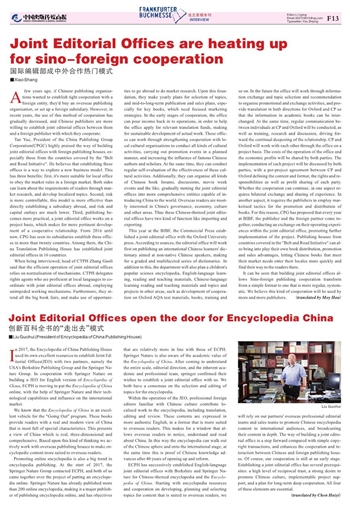A few years ago, if Chinese publishing organisations wanted to establish tight cooperation with a foreign entity, they'd buy an overseas publishing organisation, or set up a foreign subsidiary. However, in recent years, the use of this method of cooperation has gradually decreased, and Chinese publishers are more willing to establish joint editorial offices between them and a foreign publisher with which they cooperate.
Tan Yue, President of the China Publishing Group Corporation(CPGC) highly praised the way of building joint editorial offices with foreign publishing houses, especially those from the countries covered by the "Belt and Road Initiative". He believes that establishing these offices is a way to explore a new business model. This has three benefits: first, it's more suitable for local office to obey the market rules in a foreign market. Both sides can learn about the requirements of readers through market research, and develop localized topics. Second, risk is more controllable, this model is more effective than directly establishing a subsidiary abroad, and risk and capital outlays are much lower. Third, publishing becomes more practical, a joint editorial office works on a project basis, which makes for more pertinent development of a cooperative relationship. From 2016 until now, CPG has seen its subsidiaries establish these offices in more than twenty countries. Among them, the China Translation Publishing House has established joint editorial offices in 16 countries.
When being interviewed, head of CTPH Zhang Gaoli said that the efficient operation of joint editorial offices relies on normalisation of mechanisms. CTPH delegates rights agents who are proficient at local languages to coordinate with joint editorial offices abroad, employing unimpeded working mechanisms. Furthermore, they attend all the big book fairs, and make use of opportunities to go abroad to do market research. Upon this foundation, they make yearly plans for selection of topics, and mid-to-long-term publication and sales plans, especially for key books, which need focused marketing strategies. In the early stages of cooperation, the office can pour income back in to operations, in order to help the office apply for relevant translation funds, making for sustainable development of actual work. These offices can work through strengthening cooperation with local cultural organisations to conduct all kinds of cultural activities, carrying out promotion events in a planned manner, and increasing the influence of famous Chinese authors and scholars. At the same time, they can conduct regular self-evaluation of the effectiveness of these cultural activities. Additionally, they can organise all kinds of Chinese book forums, discussions, movie week events and the like, gradually turning the joint editorial offices into more comprehensive entities capable of introducing China to the world. Overseas readers are mostly interested in China's governance, economy, culture and other areas. Thus these Chinese-themed joint editorial offices have two kind of function like importing and exporting.
This year at the BIBF, the Commercial Press established a joint editorial office with the Oxford University press. According to sources, the editorial office will work first on publishing an international Chinese learners' dictionary aimed at non-native Chinese speakers, making for a graded and multifaceted series of dictionaries. In addition to this, the department will also plan a children's popular science encyclopedia, English-language learning, reading and teaching materials, Chinese-language learning reading and teaching materials and topics and projects in other areas, such as development of cooperation on Oxford AQA test materials, books, training and so on. In the future the office will work through information exchange and topic selection and recommendation to organise promotional and exchange activities, and provide translation in both directions for Oxford and CP so that the information in academic books can be interchanged. At the same time, regular communication between individuals at CP and Oxford will be conducted, as well as training, research and discussion, driving forward the continual deepening of the relationship. CP and Oxford will work with each other through the office on a project basis. The costs of the operation of the office and the economic profits will be shared by both parties. The implementation of each project will be discussed by both parties, with a per-project agreement between CP and Oxford defining the content and format, the rights and responsibilities as well as profit sharing of each party. Whether the cooperation can continue, in one aspect requires bilateral exchange and sharing of experience. In another aspect, it requires the publishers to employ marketised tactics for the promotion and distribution of books. For this reason, CPG has proposed that every year at BIBF, the publisher and the foreign partner come together, conducting an exchange on their operating experiences within the joint editorial office, promoting further implementation of the project. Publishing houses from countries covered in the "Belt and Road Initiative" can also bring into play their own book distribution, promotion and sales advantages, letting Chinese books that meet their market needs enter their locales more quickly and find their way to the readers there.
It can be seen that building joint editorial offices allows Sino-foreign publishing cooperation transform from a simple format to one that is more regular, systematic. We believe this kind of cooperation will be used by more and more publishers. (translated by Moy Hau)


